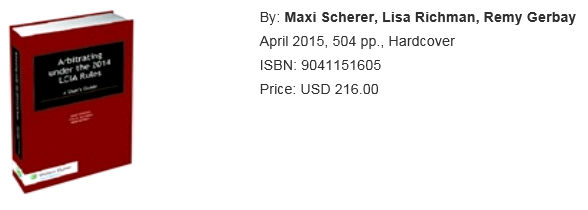We are delighted to announce the release of Arbitrating Under the 2014 LCIA Rules – A User's Guide (2015 Wolters Kluwer Law and Business), co-authored by Dr. Maxi Scherer, Special Counsel in the International Arbitration Practice Group at Wilmer Cutler Pickering Hale and Dorr LLP and Senior Lecturer at Queen Mary University of London, together with Lisa Richman and Remy Gerbay.

This highly practical and user-friendly guide offers a thorough
analysis of the
2014 LCIA Rules. It provides a comprehensive explanation of the
basic principles governing LCIA arbitration, while at the same time
offering an in-depth analysis of complex issues that may arise in
the course of LCIA proceedings.
Setting this book apart is the unique combination of the backgrounds of the authors, who bring together a diverse and complementary outlook on LCIA arbitration and combine academic and practical perspectives, common law and civil law training and practice, and vast professional and personal experience as counsel, arbitrator and former LCIA Deputy Registrar.
This book contains abundant references to relevant national court judgments, statutory provisions, up-to-date statistics and bibliographical sources on LCIA arbitration.
It covers important aspects of LCIA practice and procedure, such as:
- Key changes introduced by the 2014 Rules
- Drafting LCIA Arbitration Agreements
- Request for Arbitration and Response
- Formation of the Tribunal and challenges, removal and replacement of arbitrators
- Rules about communication, language and seat of the arbitration
- Standards of counsel and party conduct
- Multi-party arbitration, joinder of third parties and consolidation of proceedings
- Interim relief and Emergency Arbitrators
- Arbitral proceedings and hearings
- Awards and correction of awards
- Costs and deposits
- Confidentiality
This book is invaluable to business executives and corporate counsel, as well as to practitioners and scholars in the field.
Purchase the hardcover edition of the Guide.
The content of this article is intended to provide a general guide to the subject matter. Specialist advice should be sought about your specific circumstances.

